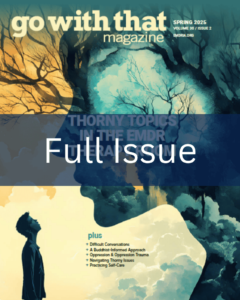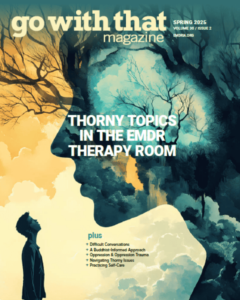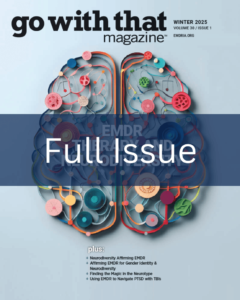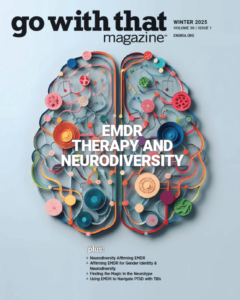Thorny Topics in the EMDR Therapy Room (Go With That Magazine® Issue)
We examine the thorny, sometimes controversial topics that surface in EMDR therapy sessions and the ethics of confronting trauma head-on.
Read MoreCounselor’s Corner: Clients with Aphantasia
EMDR therapists respond to the question, “Who has experience treating trauma with EMDR for clients with aphantasia?
Read MoreCommunity Voices: Cultural Background, Racial Identity, or Political Beliefs
EMDR therapists recall instances when a client’s cultural background, racial identity, or political beliefs posed a challenge in EMDR therapy.
Read MoreSelf-Care Strategies for Navigating Difficult Conversations
Ideas to practice self-care as a therapist during the current political polarization and constant barrage of information and opinion.
Read MoreThorny Topics: Addressing Oppression and Oppression Trauma as Difference in the Room
Talking about differences in the therapy room between therapist and client can be difficult. Here are some tips.
Read MoreTherapeutic Neutrality in an Age of Polarization: A Buddhist-Informed Approach
As an Israeli-born therapist, I watched in horror as events unfolded after Oct. 7th, followed by a surge in global antisemitism.
Read MoreDifficult Conversations in the Therapy Room
What do we do with difficult conversations in the therapy room? There are consequences, whether we avoid the issue or address it in some way.
Read MoreOn Being a Therapist in a Divided World
EMDR professionals are not immune to the pressures and tensions that our society is currently experiencing. Helping one another is important.
Read MoreEMDR Therapy and Neurodiversity (Go With That Magazine® Issue)
EMDR can be tailored to meet the unique needs of neurodivergent individuals, helping them process emotional distress and past traumas.
Read MoreNeurodiversity Affirming EMDR: Pathological Demand Avoidance – Understanding and Supporting a Unique Nervous System Response
Neurodiversity-affirming EMDR aims to support individuals through a lens that respects their unique neurotypes without pathologizing them.
Read MoreAffirming EMDR at the Intersection of Gender Identity and Neurodiversity
This article explores how therapists can adapt EMDR for clients who are both neurodivergent and identify as transgender-gender diverse.
Read MoreFinding the Magic in the Neurotype: Using EMDR with Neurodivergent Clients
Article exploring impactful adaptations to EMDR when working with neurodivergent clients, including aspects of the author’s lived experience.
Read More




